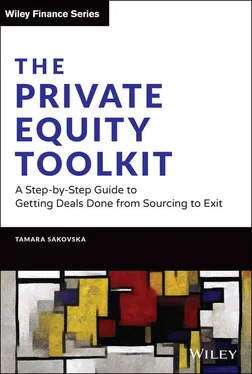Private equity is one of the most fascinating fields in contemporary finance. Private equity professionals get to explore promising investment themes, meet accomplished entrepreneurs, walk the factory floors of real businesses, determine the value of illiquid assets and engineer the main transaction terms, with heated deal negotiations often extending into the late hours of the night. Since private equity is an interdisciplinary field, successful investors need to master a wide range of skills. Thorough technical knowledge of accounting and finance does not suffice on its own and needs to be combined with solid commercial judgment and exceptional relationship-building skills. Those private equity professionals who want to succeed are expected to originate attractive investment opportunities, generate differentiated deal insights, form productive working relationships with management teams, add value on portfolio company boards and achieve profitable investment exits.
How do they acquire these skills at present? Mostly, on the job. Apart from the book that you are about to read, there appears to be no universal reference guide that one can turn to in order to get a systematic overview of the practical aspects of private equity deal execution, from sourcing to exit. When investment professionals start their careers at a private equity fund, they learn how to do their job from senior colleagues by following a “master—apprentice” training model. However, senior private equity professionals generally have little time to dedicate to coaching new hires because they themselves are spread very thinly, often consumed by live deals or portfolio company crises that always take priority. Another obstacle that young investment professionals face is a lack of opportunity to acquire more advanced and specialized skills—for instance, those relating to creating effective reporting guidelines for an investment target post-acquisition, managing an investment in distress or preparing a portfolio business for exit—as these situations arise less frequently within the lifecycle of a typical private equity investment. Given these challenges, it takes multiple years for anyone to become truly skilled across all the main aspects of the private equity profession.
My experience was no different when I started my own private equity career a few decades ago. There was no practical handbook that could walk me through the key principles of private equity investing. I had to learn on the job and am grateful to all my senior colleagues who generously shared their knowledge with me. During my formative years as an investment professional, I thought it might be a good idea to start collecting various strategies and checklists that I came across on various transactions in order to create a single sourcebook to support me in my day-to-day work. Over the years, I incorporated a number of additional useful concepts that I discovered by reading books written by experts operating in adjacent business fields, such as mergers and acquisitions, value investing, equity research, behavioral finance, strategy, sales and marketing, business operations, restructuring, organizational behavior and corporate governance.
It took me a number of years to test the multifarious concepts in my “home-made” private equity primer on real-life transactions and transform them into a series of simple, actionable frameworks to underpin key decision-making principles that—in my opinion—apply best to each phase of a private equity investment, from sourcing to exit. This extensive compilation of ideas and multidisciplinary best practices formed the basis of my personal toolkit that I could turn to every time I needed inspiration or wanted to expand my professional repertoire. These proven techniques, together with the key lessons I learned during my own investment career, represent the core of The Private Equity Toolkit .
Remarkably, to this day, there is still no single finance book that can adequately fulfill the role of a practical “how-to” guide for the private equity industry. Even though there have been many useful private equity titles published in the last 10 years, you will quickly see that they are either academic textbooks that focus on theoretical principles, or private equity “war stories” that highlight prominent transactions in the industry. So far, not many private equity deal practitioners have taken the time to step out of the deal frenzy and write a practical reference guide capturing the industry's best practices across the private equity deal lifecycle. The Private Equity Toolkit intends to fill this gap and become the industry's missing manual.
The incessant growth of the private equity industry has created increased demand from curious professionals—such as yourself—who seek to embark on an investment career and look to acquire practical knowledge of the main skills required by the private equity profession. The Private Equity Toolkit will serve as a helpful guide for business school students, investment banking and consulting practitioners exploring a private equity career, as well as private equity professionals who are just starting their journey. Even though I assume that you possess a basic background in corporate finance and accounting, I made a deliberate effort to make this book as accessible as possible to a wide audience of readers by presenting the content in plain English, skipping graphs and equations and suggesting additional resources as I step through the chapters. While The Private Equity Toolkit primarily reflects my own subjective investment experience and utilizes stacks of personal notes, it is not entirely devoid of academic rigor. In fact, in preparing this book, I have performed extensive research of each topic across both the relevant academic literature and scholarly research in order to capture the most prominent findings and incorporate what I considered to be pragmatic, actionable advice.
Still not convinced? The chapter-by-chapter outline at the end of this section provides more insight into how you might be able to enhance your existing knowledge and optimize your own approach to private equity deal execution, from sourcing to exit. Use The Private Equity Toolkit as a reference guide and feel free to jump directly to the most relevant chapter whenever you require targeted support during a particular phase of a private equity investment. Once you've taken a look at the overall book structure, let's delve into the critical components of every deal that will make up your own private equity toolkit.
Disclaimer
While this book discusses at length my own approach to making decisions at every phase of the private equity transaction lifecycle, I am not offering any investment, legal or tax advice.
How to Get in Touch
If you have comments or suggestions, why not share them with me so that I can incorporate your thoughts in the next edition of this book? I welcome your contributions and feedback. Thank you! Please email me at: petoolkit@lavragroup.com
Chapter 1: First Thoughts on Deal Sourcing
Key Topics:
Why deal sourcing remains an obscure field
Six action steps to take today to enhance your deal origination prowess
Proven deal sourcing strategies and the search for the mythical proprietary deal
How to assess your current deal sourcing capabilities
Key trends to look for now to spot future private equity deals ahead of others
Chapter 2: Thematic Deal Sourcing
Key Topics:
Take the mystique out of thematic deal sourcing with the ICEBERG Roadmap™
An effective way of breaking down your deal search into simple, executable steps
How you can systematically generate promising investment themes
Best practices for mapping out an industry, finding deals and meeting sector experts
Читать дальше












